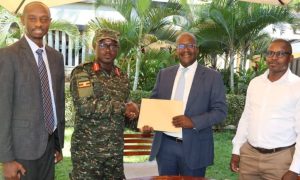Kira Municipality member of Parliament Hon. Ibrahim Ssemujju Nganda has slammed the select committee’s report on the National Social Security Fund (NSSF) insisting that the inquiry is incomplete without Gen. Salim Saleh.
According to Hon. Ssemujju, the report has glaring omissions, which add to the suspicion that the probe’s MPs soft-shoe shuffled on some ranking officials.
Ssemujju Nganda singled out the exclusion of Gen. Caleb ‘Salim Saleh’ Akandwanaho from being adversely mentioned in the hard-hitting select committee report. The report was tabled before parliament on March 1, 2023, by the committee chairperson, Mwine Mpaka.
The Mpaka-led committee made several recommendations, including the immediate resignation of Betty Amongi as minister of Gender, Labour, and Social Development; the halting of further investments in the Lubowa Housing Estate until a true landowner is ascertained; and an investigation into nepotism in fund staff recruitment and deployment by the Inspectorate of Government.
Ssemujju wondered how an entire report about NSSF could be made without a single recommendation about Gen Saleh, the younger brother of President Museveni.
“The latest confusion in the NSSF revolves around Saleh. I am not saying that Amongi is innocent, but as you can see, the power behind her is Saleh. Where could Amongi have gotten the powers to oppose directives from the president and the prime minister on the reappointment of Richard Byarugaba (former managing director of NSSF), but she opposed these orders? This is one of the problems that this parliament must deal with. The parliament, especially the NRM MPs, must have the nerve to deal with Museveni’s relatives and their involvement in government entities like NSSF. It seems one of the speakers of parliament’s instructions is to protect the president and his family from any form of reprisal when they do wrong,” he said in a Monday exclusive interview with The Observer.
Saleh is the de facto second-most powerful figure in Uganda after President Museveni. In recent months, letters emerged that showed that Saleh, who is the chief coordinator of Operation Wealth Creation (OWC), played instrumental roles in deciding how the NSSF runs its affairs.
This is subtly illustrated in Amongi’s 19-page dossier dated December 7, 2022, which was leaked to the media last January. The dossier pins Byarugaba on corruption, insubordination, and misrepresentation, among others.
In a December 7, 2022, letter to the chairperson of the board of directors of NSSF (Dr. Peter Kimbowa) explaining the deferral of Byarugaba’s appointment, Amongi made reference to a meeting held in Kapeka (Salim Saleh’s residence) the previous day.
She said, “After our meeting at Kapeka yesterday, you note that there were serious issues that have been raised on top of all the other issues I discussed with you severally. In view of the above, the concerns that were raised after the approval of the appointment of the MD (Byarugaba) during the Kapeka meeting, and other new issues ought to be re-examined by the board and clarity provided before I appoint him as recommended. Further, among the new emerging issues, I would like to know whether, in the process of making your recommendation, you considered them, or had prior knowledge or information about them, and took them into account when making your recommendation.”
OWC, led by Saleh, was launched by President Museveni in July 2013 as an intervention to distribute farm inputs to farmers and coordinate government ministries, departments, and agencies for improved service delivery aimed at transforming the 68% of Ugandans outside the money economy.
Byarugaba’s fallout with Betty Amongi stems allegedly from his refusal to grant a request of Shs 6 billion made by the fund’s line minister, Amongi, to run planned activities to support NSSF contribution compliance by employers and enhance contributions.
In one WhatsApp screenshot shared in Appendix (Y) of the report, Amongi insinuated, “Let them come to me. He (Byarugaba) withdraws his interest, and I talk to Gen (Saleh) to discontinue the investigation, and he goes.”
In her submission before the committee, Amongi said the fund lacked strategic direction if it didn’t support the third national development plan.
“Severally, the chief coordinator, OWC, has discussed his proposals at a strategic level with us, and later expressed non-implementation by the MD (Byarugaba), You are aware of the details, including the lectures at Kapeeka and Entebbe. We have not made any concrete proposals on his propositions… What should be the role of the NSSF in national development? And with the rigid position of the MD, can you assure me that he can deliver on our transformational strategic agenda? Is he willing to commit to driving our agenda?” Amongi asked.
From her discussions with Saleh, Amongi said the former had proposed a strategic investment through the grain council owing to the ready market for Uganda’s products in Kenya. The proposal was that the government, together with NSSF, form a national marketing vehicle that will organize the pathway to the huge potential markets that exist in the region and throughout Africa.
According to her declaration, the estimated overall cost to the fund for capitalization of the programme would be Shs 40 billion. However, Amongi accused Byarugaba of being rigid and refusing to commit the funds to the programme despite instructions from a ‘senior government official,” Saleh.
Ssemujju noted that if they wanted to develop the nation, there were other areas to go to but not the NSSF. “NSSF is not a charity that can donate Shs 40 billion to the Grain Council of Uganda, which is an NGO. The prime reason for the existence of the NSSF is to ensure that savers attain the highest retirement benefits from their savings. If they want money to transform the nation, then let them go to URA, the Bank of Uganda, and the Ministry of Finance. These are the savings of workers.”
He added that if the environment at the fund encourages everyone to dip their fingers into its coffers, then the savers would lose.
“We give Byarugaba credit for growing the fund to approximately Shs 17 trillion. His woes are partly for refusing to give them the Shs 40bn. Although they have recommended that Byarugaba and his team resign immediately from their jobs, nothing shall change at NSSF if the environment supervising the fund doesn’t change. The president and his relatives should not be above reprimand. It seems that among the job instructions that Speaker Anita Among and other ruling party MPs got was to protect the relatives of the president from criticism. You can see how they go off with so much.”
Speaking anonymously, a source indicated that although there is a need for the fund to support development projects, the decision must be made following a carefully guided process.
“There are several development projects that are not under state capture. The country has registered proven rates of return on investment in the rail sector, low-cost housing as recommended by the report, and police and military housing, among others. The grain council of Uganda is a high capital expenditure, low return, obscure agency that would drain and waste the savings of workers,” the source said.
“To save the fund from the usual pressures from government technocrats, the government should liberalize the pension sector and not make it mandatory to save with the NSSF. If this is done, the political class shall receive the message from the market factors of demand and supply.”
Other recommendations:
The board terminates the services of Geoffrey Sajjabi, the head of business at NSSF, with “immediate effect” over nepotism claims.
The board terminates the services of the fund’s chief finance officer, Stevens Mwanje, who was appointed when he was not a member of the Institute of Certified Public Accountants as required by law, and the Directorate of Public Prosecution (DPP) prosecutes him for working without a professional practising certificate.
NSSF to build houses affordable to savers since only three out of 300 Lubowa luxury units, costing between Shs800m to Shs3b, have been occupied.
Coftu recalls Sam Lyomoki and Peninnah Tukamwesiga as its representatives to the NSSF Board.
*The Auditor General conducts a forensic audit of transactions over the past five years on the fund’s Shs 57 billion suspense accounts.
Additional Story Credit: The Observer




















